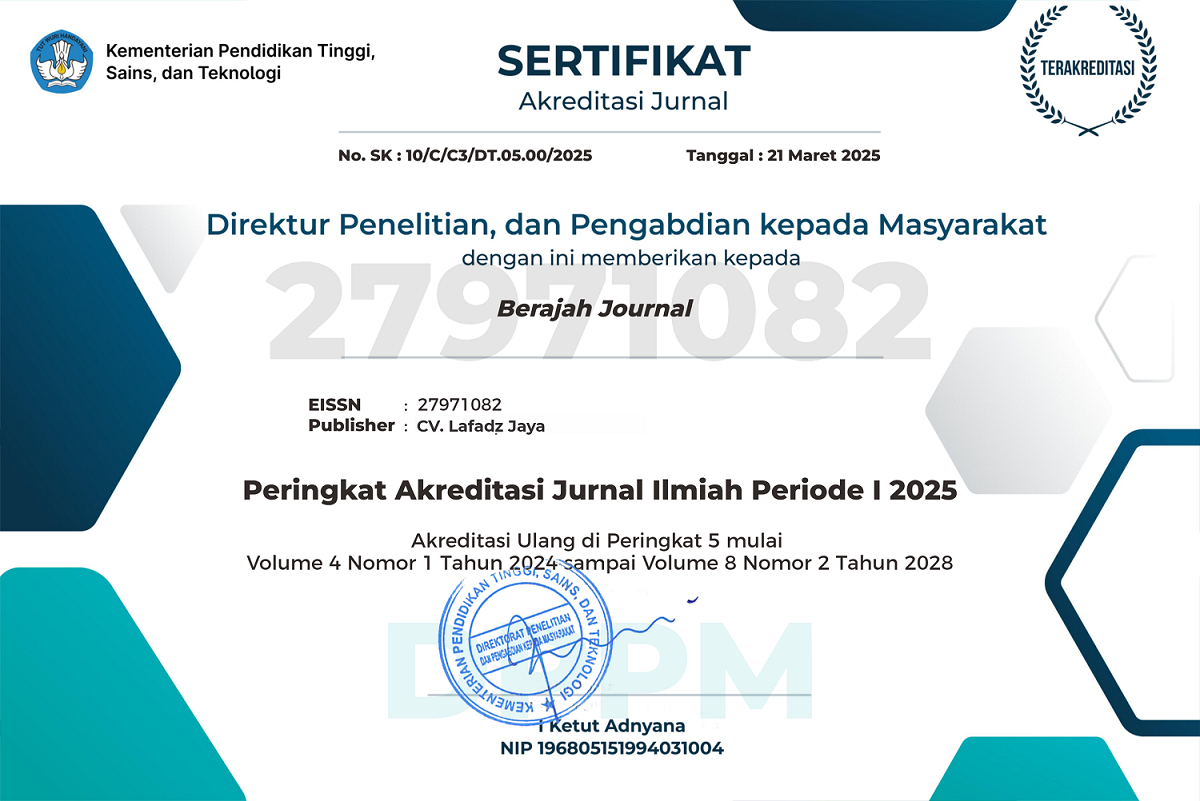IMPLEMENTASI AKAD IJARAH DALAM MEMBANGUN KEPERCAYAAN KONSUMEN PADA USAHA SEWA TENDA PONOROGO
DOI:
https://doi.org/10.47353/bj.v5i1.561Keywords:
Contract, Ijarah, Trust, ConsumerAbstract
This research aims to increase knowledge about the implementation of the Ijarah contract in the practice of renting outdoor equipment at Sewa Tenda Ponorogo to build consumer trust. This study is classified as a type of qualitative research of the Virtual Ethnography type conducted in Kadipaten Village, Babadan District, Ponorogo Regency. Research data were collected using interview techniques, observation and long-distance documentation. The results of the study concluded that the rental system carried out at the Sewa Tenda Ponorogo outdoor rental still uses conventional methods. Business owners, employees and consumers of Sewa Tenda Ponorogo also do not know what the Ijarah Agreement is, but in the implementation of the lease in accordance with the principles and provisions of ijarah including starting from Aqil or the person who rents the lease, sighat akad or ijab qabul, ujroh or rental fees and the benefits of ijarah itself. The existence of the Sewa Tenda Ponorogo rental business is very financially beneficial for business owners, then provides convenience for consumers to meet their outdoor equipment rental needs easily and at prices that are in accordance with the Ponorogo market. Consumers feel safe and comfortable when using Ponorogo Tent Rental services so they often rent again and become regular customers.
Downloads
References
As’ad Aliy. (1979). Tarjamah Fathul Mu’in 2, Kudus: Menara Kudus.
Bulbul, D. (2013). Determinants of Trust in Banking Networks. Journal of Economic Behavior and Organization, 85(1), 236–248. http://doi.org/10.1016/j.jebo.2012.02.022
Chen, Y. (2010). The Drivers of Green Brand Equity : Green Brand Image , Green Satisfaction , and Green Trust. Journal of Business Ethics, 93(1), 307–319. http://doi.org/10.1007/s10551-009-0223-9
Guenzi, P., Johnson, M. D., & Castaldo, S. (2009). A Comprehensive Model of Customer Trust in Two Retail Stores.Journal of Service Management, 20(3), 290–316
Huo, B., Ye, Y., & Zhao, X. (2015). The impacts of trust and contracts on opportunism in the 3PL industry: The moderating role of demand uncertainty. International Journal of Production Economics, 170, 160–170. http://doi.org/10.1016/j.ijpe.2015.09.0 18 Zand, D. E. (1972). Trust and Managerial Problem Solving. Administrative Science Quarterly, 17, 229–139
Knight, J., Holdsworth, D., & Mather, D. (2007). Determinants of Trust in Imported Food Products : Perceptions of European Gatekeepers. BritishFood Journal, 109(10), 792–804. http://doi.org/10.1108/00070700710821331
Kurniawan, P. (2018). Analisis Kontrak Ijarah. Jurnal El-Qanuniy: Jurnal Ilmu-Ilmu Kesyariahan Dan Pranata Sosial, 4(2), 201–213.
Mayer, R. C., Davis, J. H., & Schoorman, F. D. (1995). An Integrative Model Of Organizational Trust. Academy of Management Review, 20(3), 709–734 Rousseau, D. M., Sitkin, S. B., Burt, R. S., & Camerer, C. (1998). Not so Different After All: A CrossDisciplined View of Trust. Academy O F Management Review, 23(2), 394– 404. Doney & Cannon, 1997
Morgan, R. M., & Hunt, S. D. (1994). The Commitment-Trust Theory of Relationship Marketing. Journal of Marketing, 58(1), 20–38.
Mutafarida, B., & Anam, C. (2020). Prinsip ekonomi syariah, implementasi, hambatan dan solusinya dalam realitas politik Indonesia terkini. JESK: Jurnal Ekonomi Dan Studi Kebijakan, 1, 1–13.
Pasaribu Hairuman dan Suhrawardi K. Lubis. (2004) Hukum Perjanjian Dalam Islam, Jakarta : Sinar Grafika.
Putri, K. A., & Yasa, N. N. (2022). The Role of Customer Satisfaction as Mediating Variable on the Effect of Brand Image towards Coffee Shop Customer’s Repurchase Intention. European Journal of Business and Management Research, 149-154.
Sandi Ibe’nu Hadhiqi. (2025) Wawancara Pemilik Usaha Sewa Tenda.
Sirdeshmukh, D., Singh, J., & Sabol, B. (2002). Consumer Trust, Value, and Loyalty in Relational Exchanges. Journal of Marketing, 66(1), 15–37
Downloads
Published
How to Cite
Issue
Section
License
Copyright (c) 2025 Isna Marlina, Fatkhur Rohman Albanjari, Adib Khusnul Rois

This work is licensed under a Creative Commons Attribution 4.0 International License.






















